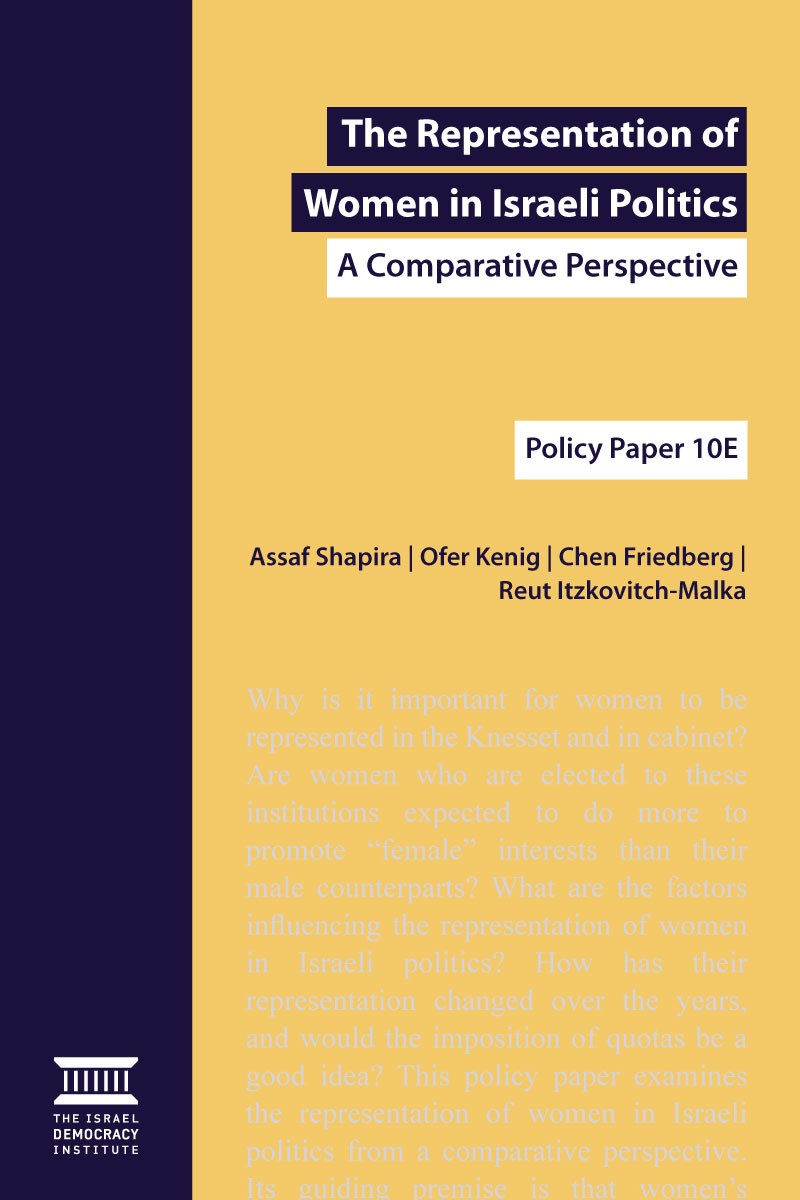The Representation of Women in Israeli Politics
A Comparative Perspective
Policy Paper 10E
- Written By: Dr. Assaf Shapira, Prof. Ofer Kenig, Reut Itzkovitch Malka,
- Publication Date:
- Cover Type: Download only
- Number Of Pages: 200 Pages
- Center: Center for Governance and the Economy
- Price: 45 NIS
For the past decade, the issue of women’s representation in the political arena has taken center stage in academia and in public discourse.
This policy paper examines women’s representation in Israeli politics over the years, and the factors affecting it, compares women’s representation in Israel with that in other countries, and analyzes how descriptive representation of women in the Knesset influences their substantive representation.
For the past decade, the issue of women’s representation in the political
arena has taken center stage in academia and in public discourse.
Underpinning the debate is the normative assumption that women’s
representation in politics, and parliaments in particular, carries
great importance: it is consistent with the values of equality and
representativeness, grants legitimacy to the democratic-liberal regime,
and helps inculcate a view of women as citizens of equal standing with
men.
From a historical perspective, although there has been a genuine improvement in women’s parliamentary representation in many countries in recent decades, in most cases equality has still not been achieved. This has led countries and parties that are aware of the importance of this issue to implement institutional measures aimed at improving women’s representation in the political arena.
This policy paper is an attempt to contribute to this important
debate. To this end, it examines women’s representation in politics over
the years, and the factors affecting it, compares women’s representation
in Israel with that in other countries, and analyzes how descriptive
representation of women in the Knesset influences their substantive
representation.
The study also assesses the institutional mechanisms adopted in Israel to enhance women’s representation in the Knesset, and proposes strengthening and supplementing the existing measures.
What does this survey teach about women's representation in Israeli politics?
-
Although there has been a marked improvement over the last twenty years with regards to women's participation in key political institutions (the Knesset and government), this rate of representation is still low in comparison to other countries.
There are major differences between parties in the Knesset that completely exclude women (mostly ultra-Orthodox and Arab parties) and those that do not. It should be noted that there today no real differences between the parties, Right and Left, on the issue of women's representation. -
Female Knesset members, more than male members of Israel's parliament, represent women's interests.
In the 17th and 18th Knesset sessions, female parliamentarians devoted more time to 'women's issues' than their male counterparts. Also, the amount of women who sat on committees dedicated to such issues exceeded the amount of male Knesset members.These findings are a primary justification for increasing women's representation in the Knesset.
Why are women underrepresented in the Knesset? How can this situation be improved?
The research literature enumerates a range of factors affecting women’s parliamentary representation. Many of these are sociocultural factors that are difficult to change, certainly in the short term: political culture, religious attitudes, women’s education, and their participation in the work force, to name a few.
Some of these institutional factors relate to the electoral system. The nature of the current electoral system—a proportional representation-list system and one large electoral district (of 120 representatives)—should in theory make it easier for for women to get elected to the Knesset.
However, this institutional feature actually makes it harder
for women to be elected. Israel’s legislature is one of the smallest
parliaments in the world, relative to the number of citizens.
As such, one idea is to enlarge the Knesset to 180 representatives, which would not only increase the total amount of women, but their proportion in parliament as well, however moderate such an increase, would be.

